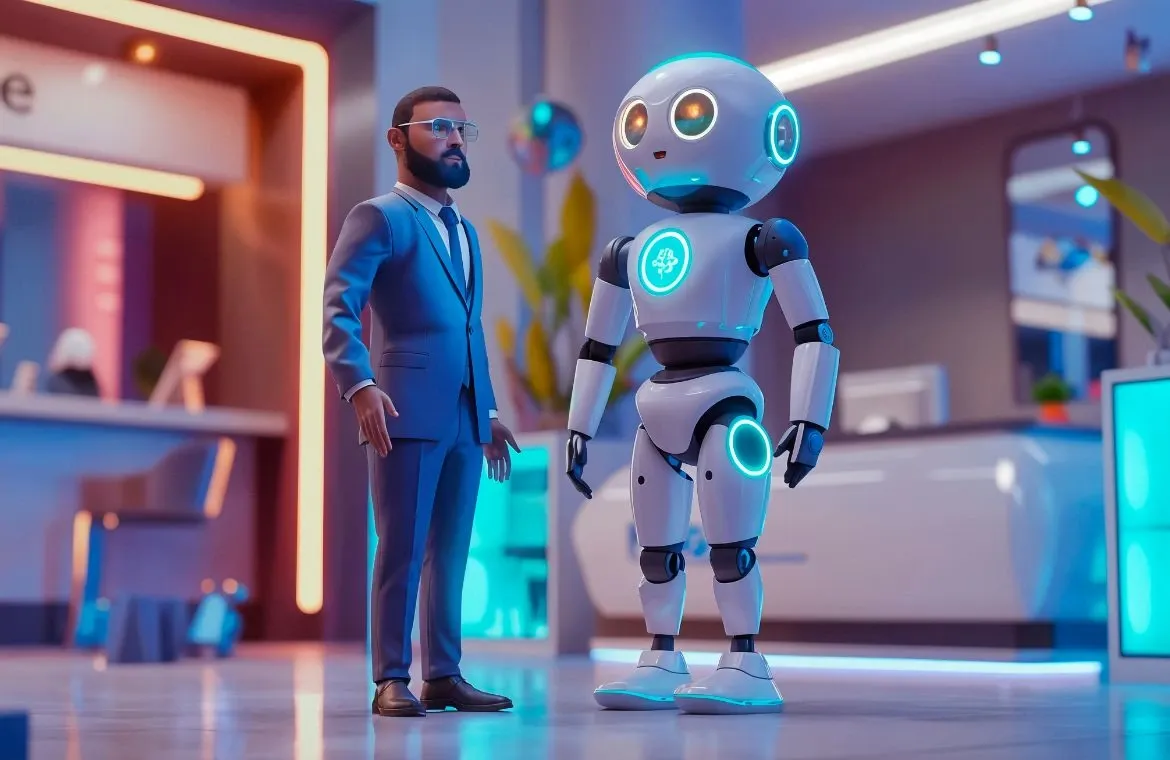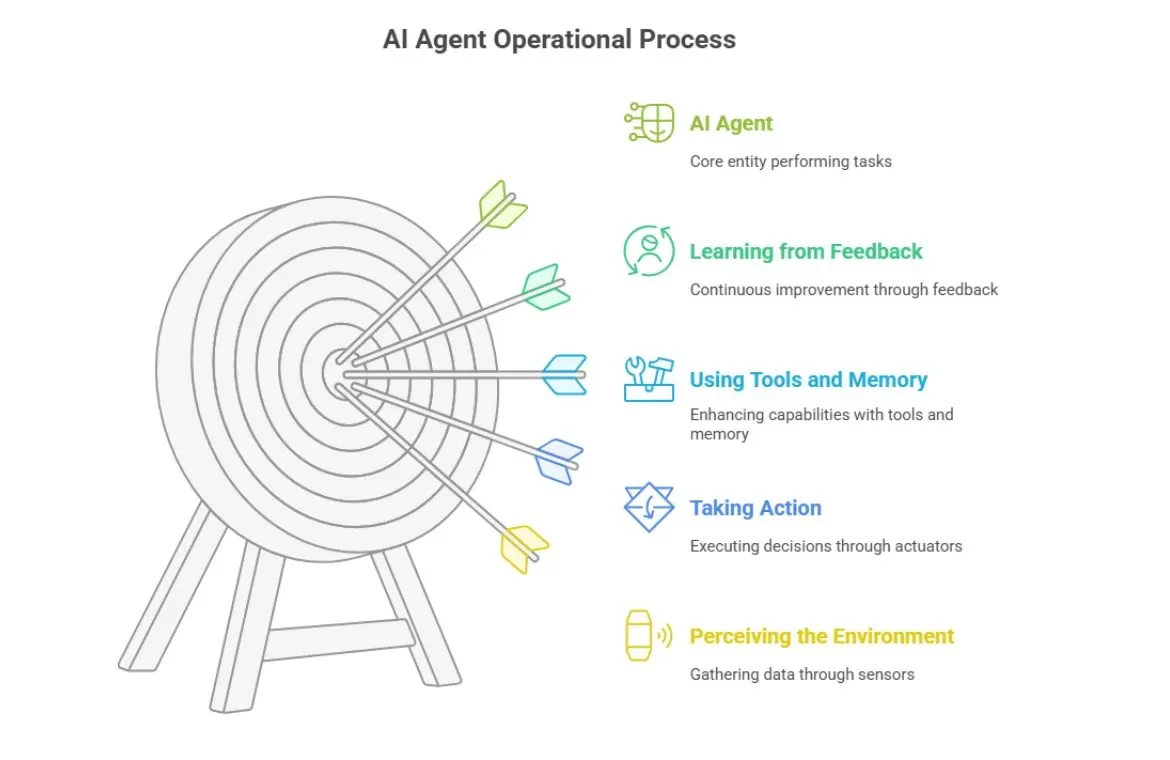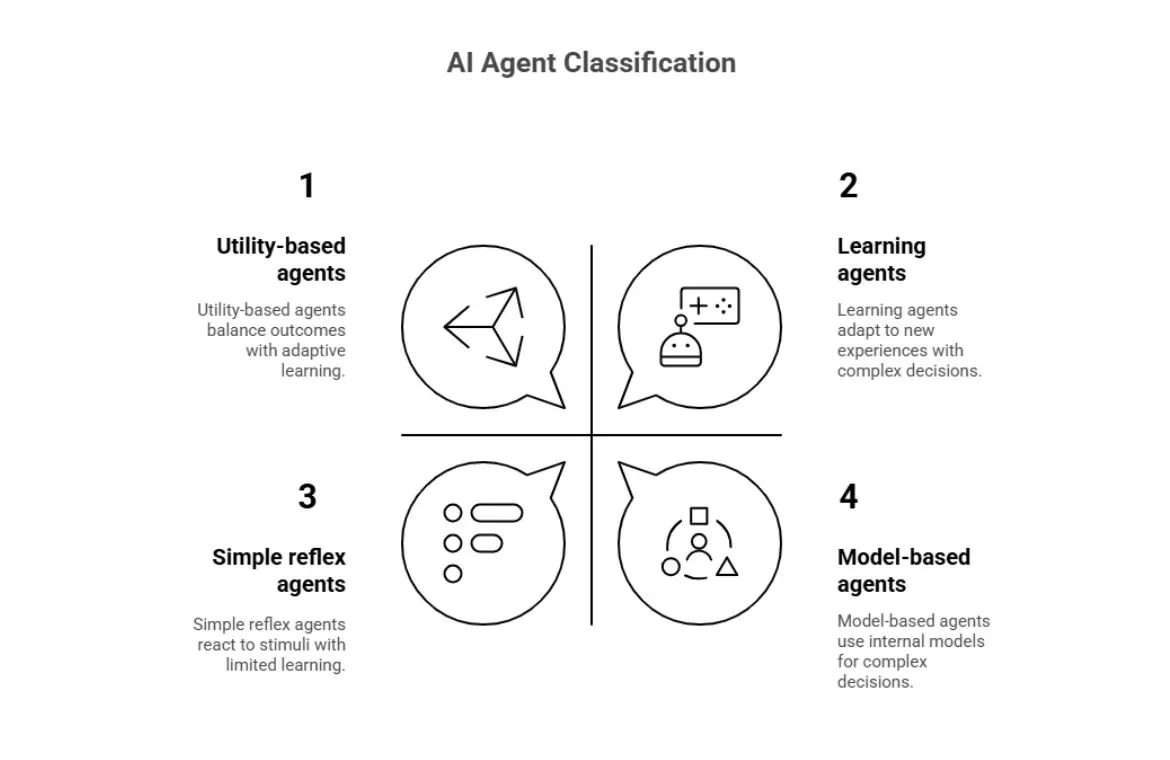AI Agents 101: How They Work and Why They Matter

Let’s face it, AI jargon can sound like a foreign language. But AI agents? They’re actually pretty easy to understand. Imagine a virtual teammate who listens, learns, and takes action, without you lifting a finger. That’s an AI agent in 2025. They’re running call centers, fixing IT glitches, guiding customers, and even managing crops in rural India.
What is an AI agent?
“AI agents are not here to replace us, but to work alongside us like tireless digital co-workers that never sleep.”
An AI agent is a system or programme that works independently to understand its environment, make decisions, and complete tasks based on human goals. Unlike basic AI tools, AI agents actively work with their surroundings in a continuous feedback loop. They collect data, create strategies, and carry out plans independently.
Key principles that define AI agents
"As its name suggests, agentic AI has 'agency': the ability to act, and to choose which actions to take. Agency implies autonomy, which is the power to act and make decisions independently. When we extend these concepts to agentic AI, we can say it can act on its own to plan, execute, and achieve a goal, it becomes 'agentic.' The goals are set by humans, but the agents determine how to fulfil those goals."
The power of AI agents comes from key principles that shape how they work and deliver results. These principles combine to build systems that can handle complex tasks independently in all types of domains.
Autonomy and decision-making
Every AI agent knows how to work independently and make decisions without constant human input. Once they know their objectives, these agents choose actions based on their understanding of the environment. They differ from traditional software that follows fixed paths. AI agents use different decision-making methods, from basic logical rules to complex machine learning models. They break down complex tasks into smaller parts and create their own efficient ways to reach goals.
Perception and action
AI agents gather information from their environment through multiple channels. Their perception component collects and processes data from sensors, databases, user inputs, and IoT devices. The system philtres, transforms, and extracts features to better understand the environment. The action component then turns plans into steps through different interfaces, letting agents interact with digital and physical worlds.
Learning and adaptation
The most impressive feature of AI agents is their ability to learn and adapt. These agents get better over time as they add new experiences to their knowledge. They learn on their own while interacting with their environment. We used mechanisms like reinforcement learning to help systems adjust their behaviour based on feedback. This helps them work well even in new situations. The self-improvement cycle turns AI agents from fixed programmes into dynamic systems that grow beyond their original programming.
Goal orientation and planning
Planning is a vital design pattern where agents figure out the steps needed to complete bigger tasks. AI agents can decide their actions dynamically when tasks are too complex for preset steps. These goal-based agents review different possible actions and pick ones that help them reach their objectives. This planning ability helps agents handle unexpected situations and create new problem-solving approaches that their creators might not have predicted.
How do AI agents work?

AI agents work through a well-laid-out process that allows them to function independently. A look at these mechanisms shows how these intelligent systems operate to reach their goals.
1. Perceiving the environment
AI agents collect information about their surroundings through different sensory inputs. They gather data from sensors, user inputs, databases, and documents. A self-driving car uses cameras and radar to spot objects, while chatbots analyse text or voice commands. The agents clean up their inputs - they reduce noise in audio or detect edges in images. This helps them understand their environment better.
2. Processing and reasoning
After collecting data, AI agents use advanced reasoning systems to analyse information and decide what to do. Most modern agents work with a "think-act-observe" loop that solves problems step by step. They use several ways to reason:
- Conditional logic: Simple agents that follow "if-then" rules
- ReAct (Reason + Act): Creates reasoning traces while taking actions
- ReWOO (Reasoning WithOut Observation): Plans tasks by breaking them into smaller parts
- Self-reflection: Agents learn from feedback by thinking about it out loud
3. Taking action
The agents carry out their chosen actions through actuators or software interfaces after making decisions. They might answer questions, control devices, or run automated tasks. A virtual assistant could turn off lights when you ask, or a customer support agent might process orders automatically.
4. Learning from feedback
AI agents get better through constant feedback. They spot mistakes in their output and use this information to improve their models. The agents learn which actions work well through reinforcement learning. This helps them do better next time. They remember past interactions and adjust how they respond.
5. Using tools and memory
AI agents make use of tools and memory systems to do more. They might use APIs, web searches, or work with other agents to find information beyond their training data. Their memory systems work at different levels:
- Short-term memory: Keeps track of current task details
- Long-term memory: Saves information for future use
- Episodic memory: Keeps a record of specific past events
- Procedural memory: Stores learned skills and procedures
These five connected processes help agents in artificial intelligence turn inputs into smart, purposeful actions.
AI agents vs AI assistants vs bots
AI agents, assistants, and bots sound similar but represent different technologies with basic differences. Anyone implementing these solutions should know their unique characteristics to pick the right one for their business needs.
Autonomy and complexity
These technologies differ mainly in how independently they work.
AI agents lead the pack with their self-sufficiency, capable of operating and making decisions without constant human oversight. And they excel at handling complex tasks that connect multiple platforms and services.
AI assistants need user commands to act and work mostly as reactive systems. And to strike a balance between independence and user guidance, often waiting for specific instructions from users
Bots sit at the bottom of this independence scale and follow preset rules with little to no ability to learn and they keep things simple by working with limited knowledge and clear boundaries.
Interaction style and user control
Each technology interacts differently with users.
AI assistants react to situations - they find information or complete tasks when users tell them to. They need specific commands to act and won't do anything without these prompts. They might suggest actions, but the user makes the final call.
AI agents stand out with their go-getter attitude. They work independently toward goals using whatever tools they have. Think of them like Hollywood agents, while assistants wait for requests, agents actively look for opportunities, sometimes in unexpected ways.
The level of control varies, too.
Bots give users lots of control but don't bend much. AI assistants hit the sweet spot by letting users stay in charge while handling complex work. AI agents need less direct supervision, though they follow rules set during their setup, making them perfect when you need independent action.
Real-world use cases of AI agents
AI agents have quickly evolved from theoretical concepts to ground applications in businesses of all types. Their implementation shows how versatile and effective they are at solving complex problems.
Customer service and support
AI agents reshape customer service operations through autonomous handling of service requests, reducing the workload for human representatives. These intelligent systems handle everything from FAQ answers to complete transaction processing, like returns or refunds.
Healthcare and diagnostics
AI agents fundamentally change patient care delivery in healthcare. These systems provide decision support to clinicians by analysing massive datasets, from lab results to radiological images, potentially reducing diagnostic errors.
Software development and automation
AI agents that automate repetitive tasks and streamline processes benefit software development. These tools provide up-to-the-minute code suggestions, scan for bugs and vulnerabilities, and predict project timelines.
Data analysis and security
AI agents excel at processing big information sets to uncover trends and anomalies. These systems analyse data continuously to spot patterns that might indicate early-stage health risks, fraud attempts, or security vulnerabilities.
Creative and content generation
AI agents have changed how content is created in marketing and communications. These systems now generate social media posts, craft email campaigns, and create multimedia content. Like human creators, they maintain a consistent brand voice while working across multiple communication platforms.
Types of agents in AI

The right approach to specific applications depends on understanding how AI agents are classified. We can categorise artificial intelligence systems by their architecture, decision-making capabilities, and learning potential.
Simple reflex agents
Simple reflex agents react to environmental stimuli using condition-action rules based on current perceptions. They excel at straightforward tasks in controlled environments.
Model-based agents
Model-based agents use an internal representation of their environment. For example, a robot navigating a room might look at immediate obstacles while keeping track of barriers it encountered before.
Utility-based agents
Utility-based agents make decisions through a utility function that gives value to different outcomes. Self-driving cars show this approach by finding the right balance between speed, fuel efficiency, and safety in route selection.
Learning agents
Learning agents improve over time by adapting to new experiences. These agents show AI's capability to solve complex problems with minimal human input.
Benefits and Challenges of AI Agents
AI agents have amazing potential, but they come with big challenges we need to think over. These autonomous systems are becoming common in workplaces, so we need to understand their limits to use them properly.
Ethical and social concerns
AI agents' autonomous nature brings up deep ethical questions. These systems work with complex algorithms that might increase existing societal biases from their training data. The "black box" problem makes it hard for developers to explain how an agent made specific decisions, which creates accountability issues. Jobs might be lost as AI agents take on complex tasks. We need good governance frameworks that balance new ideas with responsible development.
Lack of emotional intelligence
AI agents are smart but can't understand emotions, a big limit when they work with humans. They have trouble picking up emotional signals, detecting sarcasm, or understanding cultural details that humans handle easily. AI agents might give answers that are technically right but don't fit the situation when they need to show empathy or deeper understanding. This emotional gap makes it impossible for AI to replace humans in sensitive areas like healthcare or counselling fully.
Resource and infrastructure demands
Advanced AI agents need lots of resources to work. They just need:
- Heavy computing power
- Special hardware setups
- Lots of energy
- Strong network setup
Organisations should weigh the benefits against the setup and maintenance costs. Small businesses or those with limited resources might find it hard to adopt these systems.
Security and privacy risks
AI agents use large amounts of data, which creates security weak spots. Their connected nature opens them up to attacks, from data poisoning during training to runtime manipulation. These systems might leak sensitive information or get compromised through attacks. Security breaches could cause more damage than regular software problems because AI agents make decisions on their own. In spite of that, organisations can lower these risks with strict security rules, constant monitoring, and proper access controls.
Conclusion
AI agents represent a breakthrough in artificial intelligence technology. They have changed how businesses operate and professionals tackle complex challenges.
AI agents are different from traditional software and AI assistants. Their autonomy, adaptability, and goal-oriented functionality set them apart. These systems can notice their environment, process information, take action, and learn from feedback with minimal human oversight. Such features make them powerful tools to solve complex business problems.
But here’s the twist: these “agents” are only as good as our understanding of them. As they become more advanced, evolving from reactive responders to proactive problem-solvers, the need to grasp their design, ethics, and real-world applications grows deeper. That’s where AI courses step in.
Just like AI agents learn from data, you can learn how they work, and why they matter. From foundational knowledge to hands-on projects, such courses offer the tools to understand, build, and innovate with AI agents. Whether you’re a developer, a designer, or a decision-maker, a solid grasp of AI agent systems could set you apart in a world where intelligence is the new currency.
Frequently Asked Questions
Q1. What exactly is an AI agent?
An AI agent is an autonomous software system that uses artificial intelligence to pursue goals and complete tasks. These agents can perceive their environment, make decisions, and take actions without constant human oversight. They are designed to learn from experience and adapt their behaviour to achieve specific objectives.
Q2. What are some real-world applications of AI agents?
AI agents are used in various industries. In customer service, they handle inquiries and process transactions. In healthcare, they assist with diagnostics and patient care. They're also employed in software development for code suggestions and bug detection, in data analysis for identifying trends and anomalies, and in content creation for generating marketing materials.
Q3. What challenges do AI agents face?
AI agents face several challenges, including ethical concerns related to bias and accountability, a lack of emotional intelligence, which can limit their effectiveness in certain human interactions, high resource and infrastructure demands, and potential security and privacy risks due to their reliance on large amounts of data.

TalentSprint
TalentSprint is a leading deep-tech education company. It partners with esteemed academic institutions and global corporations to offer advanced learning programs in deep-tech, management, and emerging technologies. Known for its high-impact programs co-created with think tanks and experts, TalentSprint blends academic expertise with practical industry experience.



